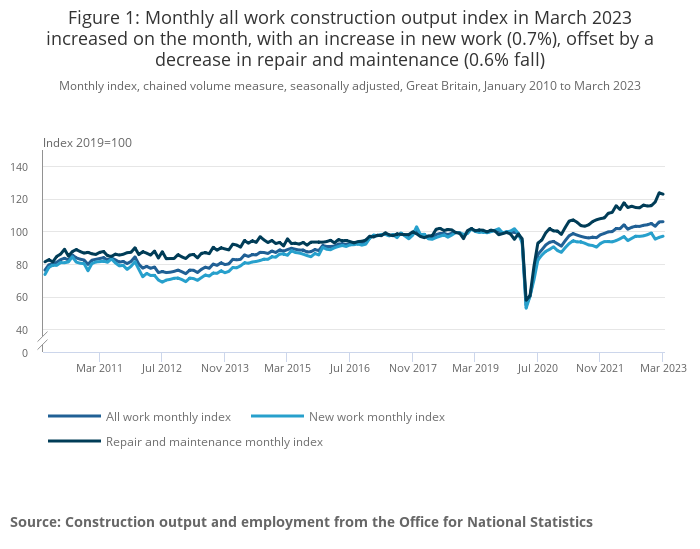The Importance of a Strong Construction CV in a Resurgent Industry…
The construction industry experienced a boom after facing pandemic challenges. New projects were on the rise, and orders reached record levels. The construction industry was resurging…After successfully recovering from the initial shock of the pandemic, the construction industry has encountered new hurdles. The recent surge in interest rates and the escalation in the cost of materials has hampered the ongoing recovery efforts, leading to project delays and creating a bottleneck in the execution of projects.
Despite these challenges, contractors continue to hire new workers and operatives. However, the labour market is delicately poised, with a fine balance between labour supply and demand. Consequently, it has become crucial to seize the best opportunities available and navigate the fiercely competitive landscape…
Whether you're just starting out in the construction industry or looking to advance your career, one thing remains constant: the importance of a well-crafted CV that helps you stand out from the crowd. A carefully written and targeted CV allows you to make a fantastic first impression and showcase your skills and accomplishments effectively.
In this blog, we're excited to share five essential tips to help you create a construction CV that sets you up for success. We'll dive deep into the key elements that make a CV effective, covering everything from structuring it correctly to highlighting your relevant experience and skills.
Your CV serves as the gateway to showcase your qualifications, skills, and unique personality. It's more than just a document; it's a customised representation of your professional journey that directly speaks to the needs and expectations of employers. By following our expert advice and implementing proven strategies, you can stand out in a crowded job market and leave a lasting impression on potential employers.
So, whether you're starting your career in construction or aiming to reach new heights, let's dive into the process of building your best construction CV and leaving a lasting impression on employers.
INDUSTRY BASICS
Despite the challenges posed by the pandemic, the UK construction industry bounced back in 2021, with new work seeing a significant increase of 15.3%, according to the Office for National Statistics. New orders also surged, rising by 30.5% to reach their highest level in over four decades. Presenting a huge opportunity for candidates...Fast forward to 2023 and total construction new orders decreased 12.4% in Quarter 1 2023 compared with Quarter 4 2022, mainly from private commercial and private housing new orders falling 22.3% and 18.4% respectively.
Recent ONS March 2023:

In the construction industry, employers place great emphasis on your qualifications, skills, and references to assess your suitability for the role. Your CV is the key tool to showcase these aspects and highlight your unique personality, which can make all the difference in standing out from the competition.
A Curriculum Vitae (CV) is a document that we submit to employers when applying for a job. However, it's essential to remember that this document is intended to serve the employer's needs, not our own. That's why it's crucial to write a CV that is tailored to the employer's requirements and is easy to read and understand. This means highlighting your skills, qualifications, and experiences that make you the best candidate for the job, based on the job description and requirements.
Recently, LinkedIn experts shared some valuable CV tips that can help job seekers stand out in the crowded job market. One of the key recommendations is to use the same language as the job description and highlight the skills and qualifications that the employer is looking for. At The Shore Group, our recruiters also emphasise the importance of this tip in identifying the right candidates for the job. By following expert advice, job seekers can improve their chances of success and land their dream job.
NEW TO THE INDUSTRY…
BASIC QUALIFICATIONS NEEDED
Taking your first steps in the construction industry can be a daunting experience, but The Shore Group is here to help. We offer support to help you get started on one of our partner's CSCS courses hosted by Functional Skills.
The courses provide valuable information on setting you up for work and can also offer CV writing support. If you have already achieved your CSCS card, the next step is to focus on crafting a winning CV. For those who need assistance with CV writing but don't require a CSCS card, keep reading.
If you're interested, please contact us at csr@theshoregroup.co.uk for more information on being directed to one of our partnership courses.
CV SUPPORT
1) Unsure of where to begin with your CV? The first step is to establish a basic structure, which should include your personal details, a personal statement, your work experience, and your skills.
2) When highlighting your work experience, make sure to focus on any roles that are relevant to the position you are applying for, as this is what employers are most interested in. And if you're using a CV template, be sure to personalise it to reflect your unique strengths and experiences.
3) The age-old "honesty is the best policy" applies to crafting your CV. Fabricating your work experience could have severe repercussions.
4) Along with being truthful, it's critical to contemplate how your CV is presented and how it will be perceived by prospective employers. Keep it concise and to the point, as excessively wordy CVs can bore the reader, while those that are too brief may neglect crucial details that could have landed you the job. Typically, a two-page CV is suggested.
5) After completing your CV, take the time to review it carefully. Check for any grammatical errors and ensure that your CV is presented in the best possible way.
PROGRESSING IN THE INDUSTRY…
ADDITIONAL QUALIFICATIONS
The qualifications required for a job position in the construction industry vary depending on the industry and the level of the position. For instance, to work in the rail industry, industry common inductions and additional courses such as track awareness, track access, site person in charge, and protecting workers on the track may be required.
To take these courses, you need a registered sponsor, such as The Shore Group. In construction, there are also options for apprenticeships, technical courses to specialise in a specific field, and management-level courses for progression. Additionally, as previously mentioned, a CSCS card is required at most levels of construction as proof of relevant training for on-site work.
TRANSFERABLE SKILLS
Organisational skills are a crucial requirement for many job roles, especially in project management where responsibilities include planning, coordinating, and managing resources, people and budgets.
In positions of people management, strong leadership and interpersonal skills are essential, for instance, in a Project Director role.
Technical skills and knowledge are also valuable, depending on the job and the company. For example, in a design position, proficiency in specific software and applications may be a key requirement, which should be highlighted on your CV if you possess such skills. The job requirements listed in the advertisement can guide you on the necessary skills required for the position.
A rigid career structure is not necessary, and you may discover that you want to pursue a different career or advance at a later stage in life. Transferrable skills are critical in such instances, as they enable you to leverage the skills gained from one job to benefit other careers. At The Shore Group, our co-founder emphasises that even though we have a defined structure, individuals are not required to follow a set path. According to Lewis Yorke-Johnson (click to see the video content here),
"While we have a clear structure, it doesn't mean you have to follow that path. You can easily change direction if it suits both the individual and the company."
CV SUPPORT FOR PROGRESSION
If you've been in the same job for a long time, you may not have updated your CV or be using an outdated template. A recruitment consultant can provide valuable guidance on how to update your CV, including what to include and how to showcase your skills. They act as your advocate, highlighting your experience and skills to secure the best possible job and salary. They can also provide current information on CV best practices, interview techniques, and tips for presenting yourself in the best possible light. Our White-Collar Department can assist you in this respect.
WHITE COLLAR RECRUITMENT
Our White-Collar department is dedicated to matching candidates of all levels, from entry-level to director-level, with suitable positions in the M&E, property, and construction sectors. They work closely with businesses to identify their recruitment needs and provide them with high-calibre candidates. They also help candidates find the right job opportunities that align with their skill set. White-Collar’s CV insights:
“We receive and review many CVs in White-Collar, the ones that stand out are the CV’s that clearly showcase a candidate’s skillset and role responsibilities whilst also clearly highlighting critical information regarding their specific involvement with contractors and projects, IE which contractor they worked for, on what project and when. This information being easily and quickly accessible will make your CV stand out ahead of the rest.”
UK ID REQUIREMENTS
When embarking on a career in construction, it's important to be prepared for the necessary documentation checks. You'll typically need to provide your passport or ID card, proof of address, proof of national insurance, and share codes (if applicable).
To break it down:
British Nationals requirement for majority of positions, for example labouring work:
Passport and Birth Certificate are acceptable forms of identification, if you do not have these, can be ordered using the following links:
- Non-British Nationals:
- A valid share code – this application was put in place by the Home Office following the EU Settlement Scheme. If unsure what this is, please visit https://www.gov.uk/view-prove-immigration-status.The correct Visa for allowing you to work in the UK
- Other Required Documentation:
- Proof of address – utility bill dated within 3 months or bank statement dated within 3 monthsProof of national insurance – letter received from Gov.UK or old payslip
If you are searching for a career, we offer various departments to assist you in your recruitment journey. If you are interested in Mechanical and Electrical, Fit Out, or Construction (such as Labouring) positions, reach out to our recruitment sector. For entry-level to director roles, browse our job listings on LinkedIn through our White-Collar Department. You can reach any of our departments at 01273 465636
If construction isn’t for you and retail is where your interest lies, why not contact our Nottingham office: 01156 849900


